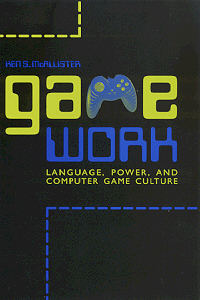introduction
|
| gamework | |||
|
In order to avoid the simplistic discourse that marks much of the way that computer games are treated in the popular press, McAllister adopts what Douglas Kellner describes as a "multiperspectival" approach to computer games; that is, he approaches the cultural study of computer games from "the perspectives of political economy and production, text analysis and audience reception [by] delineating the multiplicity of subject positions, or perspectives, through which audiences appropriate culture" (Kellner qtd. by McAllister 3). As opposed to criticism of computer games that focuses on the question of what computer games and the computer game industry should or should not be in the future2, McAllister's multiperspectival approach yields a rich and deep description of the present tense of the computer game industry and its resulting layered influences on global mass culture. McAllister avoids one-dimensional characterizations of the computer game industry by referring to it, its effects, and its influences as the computer game complex: "the combination of computer games, games, and the industries that support them" (28-9). As becomes clear from this definition, the computer game complex is comprised of a number of diverse cultural, economic and sociopolitical forces that intersect in the production and consumption of computer games. These different and often conflicting forces work together in a dialectical way to create an amalgamation of cultural, political, and economic processes that give the computer game complex the appearance of uniformity and agreement. McAllister addresses these forces under five rhetorical categories. They include:
McAllister concludes that computer games represent a significant site of struggle, "a point in the dialectic where rhetorical forces are exerted in an effort to gain dominance over competitors, technologies, players, concerned citizens, and the media" (25). The effects of these rhetorical forces are what McAllister calls the gamework: the "medium through which values are articulated and reproduced," sometimes on a mass scale (26). |
|||
